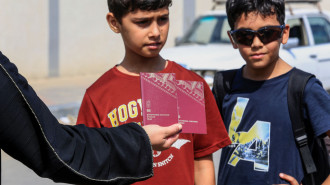Muslim Brotherhood to be excluded from Egypt ‘national dialogue’
The general coordinator of an Egyptian “national dialogue” initiative has ruled out any participation by the opposition Muslim Brotherhood in the process.
Diaa Rashwan, who also heads Egypt’s Press Syndicate and State Information Service, said on Tuesday that “all factions which took part in killing or incitement to violence or terrorism will be excluded from the national dialogue” - government rhetoric that is regularly used against the popular movement.
The national dialogue initiative was launched earlier this year by the government of Egyptian President Abdel Fattah al-Sisi.
It is meant to bring together representatives from various Egyptian political forces, civil society groups, and think tanks, and a number of figures associated with the Egyptian liberal and left-wing opposition are taking part.
Egyptian state-affiliated media have called it a “step towards a modern, civil and democratic state”.
“This dialogue can include everyone, Egypt is a country which is big enough for everyone and our disagreements do not ruin the affection between us,” Rashwan said on Tuesday.
However, critics have accused the Egyptian government of not being serious about genuine political reform, pointing to the continued suppression of rights and freedoms and imprisonment of government opponents.
In 2013, current Egyptian President Sisi led a military coup against his predecessor, Mohammed Morsi, a member of the Muslim Brotherhood who won democratic presidential elections the previous year.
Sisi arrested and imprisoned tens of thousands of coup opponents from the Muslim Brotherhood and other political groups, using trumped up charges such as “inciting terrorism” and “spreading false news” to sentence them to long periods in prison.
Hundreds of Muslim Brotherhood supporters were massacred by the military in Cairo’s Rabaa Square in August 2013.
The Arabic Network for Human Rights Information estimated that there were 65,000 political prisoners in Egypt in 2021. At least 26,000 were held in pre-trial detention, according to the network.
Mohammed Sudan, a Muslim Brotherhood leader, recently told The New Arab’s Arabic-language service that there were recent contacts between the group and Egyptian government officials, but downplayed them.
He said that there were no changes “on the ground” and that the officials had been acting in an individual capacity.
“There is great pressure from the US on the Egyptian regime to reconcile with the Brotherhood, but until now we don’t know the reason for this,” he said.
Sudan added that while the Egyptian government was demanding that the Muslim Brotherhood recognise Sisi’s legitimacy as a president in return for reconciliation, the Muslim Brotherhood was calling for the release of all political prisoners.
![National dialogue coordinator Diaa Rashwan said the Muslim Brotherhood was being excluded for its "violence" [Getty]](/sites/default/files/styles/large_16_9/public/2022-07/GettyImages-461333242.jpg?h=2ffd00db&itok=H6pK4Uye)



 Follow the Middle East's top stories in English at The New Arab on Google News
Follow the Middle East's top stories in English at The New Arab on Google News


![The US vetoed a UN Security Council (UNSC) resolution demanding a ceasefire in Gaza [Getty]](/sites/default/files/styles/image_330x185/public/2185152251.jpeg?h=7ef8ac04&itok=RpLSj2pu)